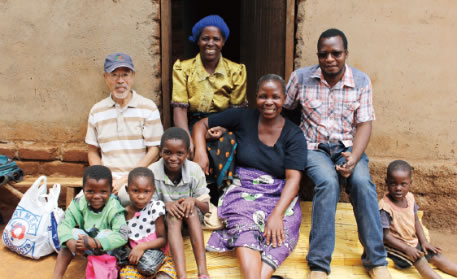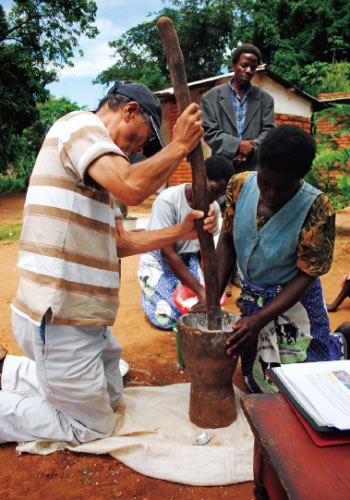Stories from the Field 02
JICA Volunteers Support Dairy
Farming in Malawi
– Developing activities for improving veterinary techniques

A monitoring survey is carried out in a farm. (Mr. Shigeru Nishida is at the left side of the back row) (Photo: Shigeru Nishida)
Malawi is a traditional agricultural nation, with approximately 80% of the entire population living in rural farming villages. The predominant lifestyle is one of self-sufficiency, with people growing and consuming their own corn, which is a dietary staple in the country. Since rain-fed agriculture is the main form of farming in Malawi, which completely relies on rainfall, the country is susceptible to poor productivity and low per capita income.
From the perspective of public nutrition, it has been noted that Malawi should rear dairy cattle as a source of animal protein. It has also been pointed out that Malawi needs to achieve self-sufficiency in dairy production, since the milk sold in urban areas is imported. Since 1995, Japan has continuously provided assistance for more than 20 years, mainly through JICA volunteers, aiming to achieve the production of semen for artificial insemination of cattle, develop and nurture artificial insemination technicians, and boost the incomes of dairy farmers.
Since 1995 a total of 25 JICA volunteers, including Japan Overseas Cooperation Volunteers (JOCV) and Senior Volunteers (SV) have been dispatched to Malawi. One of these volunteers is Mr. Shigeru Nishida, a veterinary surgeon, who had spent two years in Malawi as a SV since 2014.
As an employee of Miyagi Prefecture, Mr. Nishida was for many years involved in the rearing, breeding, and infectious disease prevention of livestock, working at the prefectural animal industry experiment station and the animal health and hygiene office. By the age of 58, Mr. Nishida had reached management level. At that time, he wished to work with animals and work overseas while he was still fit and healthy, so he took early retirement and applied to JICA’s SV program. His first placement was in Saint Lucia, where he worked for two years in the field of livestock rearing. Afterwards, he spent a further two years in Samoa, where he engaged in farm management. He was able to utilize his knowledge and skills in both countries. His third assignment was to Malawi.

Mr. Shigeru Nishida pounds ingredients for bovine supplements. (Photo: Shigeru Nishida)
He was assigned to the local Blantyre office of the District Agriculture Development Office of the Ministry of Agriculture, Irrigation and Water Development. His assigned tasks include providing assistance to promote dairy farming and improve the veterinary techniques of livestock medical technicians (assistant veterinary surgeons). Furthermore, he was also requested by JICA to follow up on the program that has introduced and spread artificial insemination techniques in Malawi. However, after having arrived in Malawi and studied the situation, Mr. Nishida noticed a particular issue.
Mr. Nishida explains, “Dairy farming comprises various steps, from the pregnancy of dairy cattle, to delivery, lactation, milking, and sale of raw milk. In the case of Malawi, farmers had not reached the first step of getting the cows pregnant, and production of raw milk was extremely low. The reason behind this pregnancy issue was low reproductive function due to poor nutrition. Because of this, even with artificial insemination, the ovaries did not develop sufficiently to reach the stage of pregnancy.”
To counter this issue, Mr. Nishida set about trying to improve the nutrition level of dairy cattle. He supplemented them with the minerals and vitamins that cows sometimes lack. These efforts included providing supplements using self-supplied feed procured locally, as well as producing cattle feed from naturally growing wild grasses in the vicinity (known as “wild grass silage”). “Wild grass silage” is made by placing wild grasses that grow in abundance in the rainy season into large bags and leaving them to ferment so they become cattle feed. Mr. Nishida also gave guidance on diagnostic technologies to livestock medical technicians, in order to improve their skills in disease diagnosis of cattle.
In Malawi it takes approximately seven or eight months of classes to become qualified as a livestock medical technician. However, the actual level of knowledge among technicians is not very high and they also lack basic equipment for diagnosis and treatment, such as stethoscopes and thermometers. In response to these issues, Mr. Nishida provided guidance on diagnosis and treatment methods that can be accomplished even with limited equipment. These methods include identification of disease by “looking, touching, and listening” to symptoms, diagnosis of ovarian dysfunction through rectal examinations, and how to assist difficult delivery using parturition techniques. In addition, towards the end of his assignment Mr. Nishida sought to ensure that these various techniques become the standard practice. To do so, he created a manual on dairy cattle rearing for dairy farmers and a manual on diagnosis of dairy cattle diseases for medical technicians.
Mr. Nishida says, “Through the support provided by Japan to date, some of the production sites, including government-operated farms, are now able to conduct artificial insemination. However, in order to spread this technology more broadly to rural farmers, it is essential to develop human resources who will be responsible for animal husbandry and dairy farming administration at the local level in Malawi.”
Mr. Stanford Muyila was a local staff member at the Blantyre office who had worked with Mr. Nishida on various activities, including the compilation of the manuals. In August 2016, he came to Japan as an overseas adult student under the ABE Initiative.1 For the next two years he will be studying cattle feed, nutrition, and animal feeding at the graduate school of Obihiro University of Agriculture and Veterinary Medicine.
Mr. Nishida is confident that in the near future Mr. Muyila will be one of the key figures supporting dairy farming in Malawi.
*1 The African Business Education Initiative is one of the policies that was announced by the Government of Japan at the Fifth Tokyo International Conference on African Development(TICAD V)in Yokohama in 2013. The initiative is a five-year plan from 2014 to provide 1,000 students from Africa with opportunities to study for master’s degrees at Japanese universities as well as do internships at Japanese enterprises, with the aim of developing outstanding human resources who will drive industrial development in Africa.
<< Previous Page Next Page >>
Main Text | Statistics and Reference Materials | Stories from the Field | Master Techniques from Japan to the World | ODA Topics
